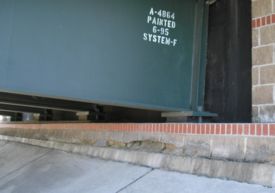Category:1045 Paint for Structural Steel

This article establishes procedures for inspecting, sampling and reporting paint and paint constituents. Refer to Sec 1045 for MoDOT’s specifications.
Discussions on non-standard colors of structural steel paint and color of structural steel paint policies are available.
For Laboratory testing and sample reporting procedures, refer to EPG 1045.6 Laboratory Testing Guidelines for Sec 1045.
1045.1 Apparatus
All sample containers and equipment used in sampling paint and paint constituents shall be clean and free of all contaminants. The apparatus required shall consist of:
(a) Appropriate size and type of sample container as given in the following subsections for the type of paint to be sampled.
(b) Appropriate thief or sampling device to obtain a representative sample.
(c) Packaging and labeling materials as described in EPG 106.3.1.2.2 Transportation of Samples and EPG 106.3.1.3 Sampling Supplies.
1045.2 Procedure
Samples shall be taken by, or under the direct supervision of, the inspector, using all possible caution, skill and judgment to ensure that a representative sample is obtained.
When sampling paint and paint constituents, take precautions to ensure that the samples are not contaminated or altered by any material not representative of the lot being sampled. Some paints or liquid constituents exhibit a tendency to settle or separate upon standing. Because of this, it is important to ensure that containers to be sampled, no matter the size container, is uniform prior to obtaining a sample. Mark all sample containers with the type of material, lot number, and the inspector's identification number. It is essential that samples of constituents be marked with the chemical names as called for in the given specification. Unless specifically requested, obtain only one random sample from each lot, batch, day's pack or other unit of production. In cases where several small lots are uniformly mixed in a larger mixer or tank, the mixed material shall be considered as one lot.
Whenever possible, obtain samples from original, unopened containers for all types of materials. When constituent containers have no markings distinguishing between units of production, take samples from different containers or storage units in the ratio of two samples for each 10,000 pounds (4500 kg) or portion thereof and blended in equal quantities to form a composite sample. Submit constituent samples only when requested by the Laboratory.
Packaging must comply with the applicable requirements of Sec 1045.
1045.2.1 Vehicle Constituents
When samples are requested by the Laboratory, ensure that the contents of the container or tank to be sampled has been thoroughly mixed. Fill the sample container, leaving approximately one inch (25 mm) space for expansion. Secure friction top lids with clips or other fastening devices before shipment. Observe shipping regulations when preparing samples for shipment.
1045.2.2 Pigments
When the Laboratory requests samples, open the package or storage container and take a sample at random from the contents.
1045.2.3 Mixed Paints
Sample containers are one quart (1 L), friction top cans and should be filled, leaving approximately one inch (25 mm) space for expansion. The inspector may mark and submit an original, unopened container of paint to the Laboratory in cases where the containers are small, such as quarts (L) or gallons (L). When an original container of paint cannot be sent to the Laboratory and there are no facilities for mixing or shaking the material mechanically, the inspector must ensure a representative sample by the following steps:
(a) Pour off the top liquid into a clean, suitable container having a volume equal to or larger than the one being sampled.
(b) Stir the settled portion of the paint with a paddle, gradually reincorporating the poured off liquid in small quantities until all has been returned.
(c) Mix the paint by pouring it back and forth between the two containers several times.
(d) Obtain a sample promptly so that settling does not occur before the sample is obtained.
NOTE: This process is referred to as “boxing” the material.
When samples are taken during the filling of containers, obtain a composite sample by combining samples taken at the beginning, middle, and near the end of the operation.
Mechanically mix paint in holding tanks or 55 gallon (208 L) drums to ensure uniformity and sample promptly after mixing.
1045.2.4 Submission of Samples
Paint and some paint constituents require special handling. See EPG 106.3.1.2.2 Transportation of Samples and EPG 106.3.1.3 Sampling Supplies for packaging, labeling and marking instructions. Enter a Basic Sample Data report into AASHTOWARE Project (AWP) (see AWP MA Sample Record, General) for each sample of material submitted to the Laboratory. Include all pertinent information necessary to the sample, such as: kind of paint or constituent, batch or lot number, project number, purchase order or "general construction" for warehouse stock, inspector, source, quantity, intended use, contractor, destination, manufacturer's name and address.
1045.2.5 High Solids Inorganic Zinc Silicate Coating

Refer to the applicable requirements of Sec 1045 for requirements pertaining to prequalification. The list of paints that are qualified by manufacturer and brand name appears as Qualified High Solids Inorganic Zinc Silicate Paints. Sample each batch or lot of each component. A sample consists of one pint (500 mL) of inorganic silicate vehicle, one pint (500 mL) of metallic zinc powder and four ounces (120 mL) of activator component. Note that the activator is not to be sampled in metal containers and will be required only when sampling 3-component, high-solids primer. Submit the samples to the Laboratory through AWP, including the brand name, the batch or lot number of each component and the net weight (mass) shown on the container of each component.
1045.2.6 Polyurethane System G Final Coating
Refer to the applicable requirements of Sec 1045 for requirements pertaining to prequalification. The list of paints that are qualified by manufacturer and brand name appears as Qualified Epoxy\Polyurethane Paints. Sample each batch or lot of each component. A sample consists of each component in the approximate volume proportions recommended by the manufacturer so that the mixed sample will consist of at least one quart (1 L). Submit the samples to the Laboratory through an AWP record, including the brand name, the batch or lot number of each component, and the net weight (mass) shown on the container of each component.
1045.2.7 High Solids Epoxy Intermediate Coat
Refer to the applicable requirements of Sec 1045 for requirements pertaining to prequalification. The list of paints that are qualified by manufacturer and brand name appears as Qualified Epoxy\Polyurethane Paints. Sample each batch or lot of each component. A sample consists of one pint (500 mL) of each component. Submit the samples to the Laboratory using an AWP record, including the brand name, batch or lot number of each component, and the net weight (mass) as shown on the container of each component.
1045.2.8 Waterborne Acrylic System H Intermediate and Finish Coating
Refer to the applicable requirements of Sec 1045 for requirements pertaining to prequalification. The list of paints that are qualified by manufacturer and brand name appears as Qualified Waterborne Acrylic Paints. Sample each batch or lot of each intermediate or finish coat. A sample consists of one quart (1 L) in a friction top can. Submit the sample to the Laboratory through an AWP record, including the brand name, the batch or lot number of each component, and the net weight (mass) shown on the container.
1045.2.9 Aluminum Epoxy Mastic Primer
Refer to Sec 1045 for requirements pertaining to prequalification. Aluminum epoxy mastic primer is not suitable for use in contact with freshly poured concrete. Brands that have been qualified are listed in Qualified Aluminum Epoxy Mastic Paint. Sample each batch or lot submitted for use. A sample consists of one pint (500 mL) of each component in friction top cans. Submit the sample to the Laboratory through an AWP record, including the brand name, batch or lot number(s) of each component, and the weight (mass) shown on each container.
1045.2.10 Gray Epoxy Mastic Primer
Refer to Sec 1045 for requirements pertaining to prequalification. Gray epoxy mastic primer may be used in lieu of aluminum epoxy mastic. The list of paints that have been qualified by manufacturer and brand name are listed in Sec 1045. Each batch or lot submitted for use shall be sampled. A sample consists of one pint (500 mL) of each component in friction top cans. Submit the sample to the Laboratory through an AWP record, including the brand name, batch or lot number(s) of each component, and the weight (mass) shown on each container.
1045.2.11 Organic Zinc-Rich Coating
Refer to the applicable requirements of Sec 1045 for requirements pertaining to prequalification. The list of paints that are qualified by manufacturer and brand name appears as Qualified Organic Zinc Paints. Sample each batch or lot of each component. A sample consists of one pint (500 mL) of organic vehicle, one pint (500 mL) of metallic zinc powder and four ounces (120 mL) of activator component. Note that the activator is not to be sampled in metal containers and will be required only when sampling 3-component, high-solids primer. Submit the samples to the Laboratory through AWP, including the brand name, the batch or lot number of each component and the net weight (mass) shown on the container of each component.
1045.3 Acceptance
Confirm that the paint is on the current approved list and that the paint is within its shelf life. Obtain a certification specific to the batch of paint, with lot or batch numbers, date of manufacture and quantity represented by the certification. Confirm that the lot or batch of paint has been sampled and approved by the Laboratory. If not, sample the paint and submit it for approval prior to use.
1045.4 Sample Record
The Laboratory will issue the reports for samples submitted to the Laboratory. Sample records indicating acceptance for project use will typically state “Prior Approval or Acceptance”, and will include the information provided in the certification, and where the certification is filed.
Articles in "1045 Paint for Structural Steel"
The following 3 pages are in this category, out of 3 total.